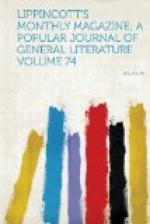And thou art shy as she,
But mortal, or I had not found thy shrine,
To listen breathlessly
If I may make thy hoarded secret mine.
Thy tender mottled breast,
Dappled the color of our primal sod,
Now quick and song-possessed,
Doth seem to hold the very joy of God,—
Joy hid from mortal quest
Of bosky loves on silver-mooned eves,
And the high-hearted best
That swells thy throat with joy among
the leaves.
Like the Muezzin’s call
From some high minaret when day is done,
Among the beeches tall
Thy voice proclaims, “There is no
God but one.”
And but one Beauty, too,
Of whose sweet synthesis we ever fail:
She flies if we pursue,
Like thy swift wing down some dim intervale.
For thou art lightly gone;
Gone is the flute-like note, the yearning
strain,
And all the air forlorn
Is breathless till it hear thy voice again.
But thou wilt not return;
Thou hast the secret of thy joy to keep,
And other hearts must learn
Thy tuneful message, ere the world may
sleep,—
Sleep lulled by many a dream
Of sylvan sounds that woo the ear in vain,
While still thy numbers seem
To voice the pain of bliss, the bliss
of pain.
MARY C. PECKHAM.
A FOREST BEAUTY.
Last spring, or possibly it was early in June, I was walking, in company with an intelligent farmer, through a bit of heavy forest that bordered some fields of corn and wheat, when a golden, flame-like gleam from the midst of the last year’s leaves and twigs on the ground at my feet attracted my sight. I stooped and picked up a large fragment of a flower of the Liriodendron Tulipifera which had been let fall by some foraging squirrel from the dark-green and fragrant top of the giant tree nearest us. Strange to say, my farmer friend, who owned the rich Indiana soil in which the tree grew, did not know, until I told him, that the “poplar,” as he called the tulip-tree, bears flowers. For twenty years he had owned this farm, during which time he had cut down acres of forest for rails and lumber, without ever having discovered the gorgeous blossom which to me is the finest mass of form and color to be seen in our American woods. As I had a commission from an artist to procure a spray of these blooms for her, I at once began to search the tree-top with my eyes. The bole, or stem, rose sixty feet, tapering but slightly, to where some heavy and gnarled limbs put forth, their extremities lost in masses of peculiarly dark, rich foliage. At first I could distinguish no flowers, but at length here and there a suppressed glow of orange shot with a redder tinge showed through the dusky gloom of the leaves. Lo! there they were, hundreds of them, over three inches in diameter, bold, gaudy, rich, the best possible examples of nature’s




